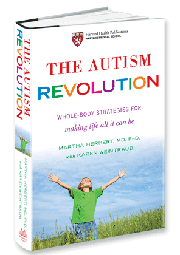This section contains a definition of transformational practices from a systems point of view. Going forward, it will discuss and analyze practices from the vantage point of how they contribute to increased robustness and resiliency.
A technical way of describing what I mean by “transformational practices” uses language from systems theory: practices that increase the robustness and integration of a complex system.
According to the venerable Wikipedia’s entry under Robustness (evolution), Robustness of a biological system (i.e. biological robustness [1]) is the persistence of a certain characteristic or trait in a system under perturbations or conditions of uncertainty.[2][3]
Vulnerability would be the opposite of robustness and would relate to the loss of organization under stress.
Several discussions on this website are pertinent:
- Framing autism as a Regulatory Disorder relates to this because problems with regulation may be related to loss of robustness.
- Increasing Total Load may lead to the degradation of robustness.
- With increased Total Load and more fragile regulation, we may see the emergence of autistic behaviors.
Practices that make components of a system more RESILIENT can be transformational because a more robust and integrated complex system can have more options for nuanced, differentiated response to novelty and challenge.
Here are some initial links to websites promoting transformational and regenerative practices:


